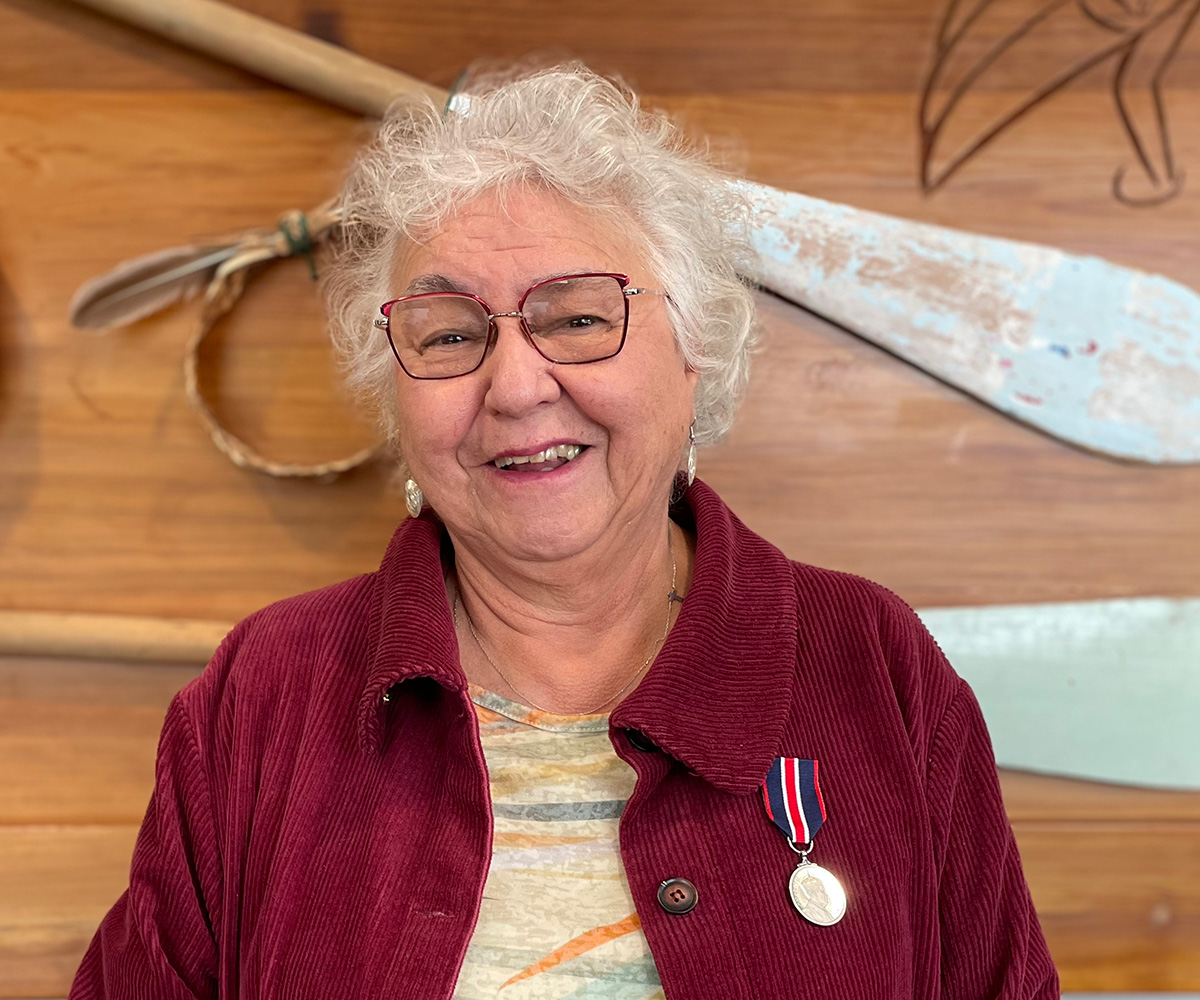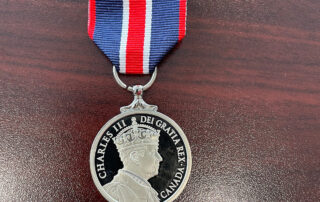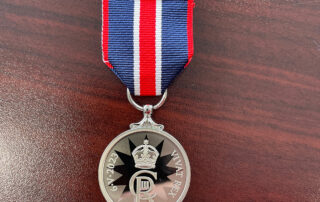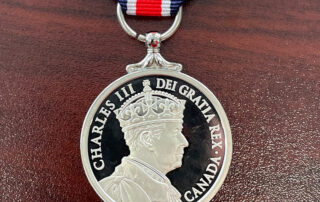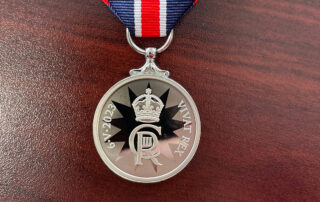Mavis Underwood Receives the King’s Coronation Medal: A Legacy of Leadership and Service
In this special community spotlight, we have the privilege of speaking with Mavis Underwood, a respected member of the SȾÁUTW̱ community, who has recently been honoured with the King’s Coronation Medal. This prestigious recognition celebrates her lifelong commitment to leadership, advocacy, and community service, particularly for Indigenous peoples. In this interview, Mavis reflects on her journey, the challenges she has faced, and her deep connection to her roots as she continues to inspire future generations with her tireless dedication to improving the lives of those around her.
I understand there are about 30,000 of these medals issued across Canada. It’s really a recognition of people for leadership, service, and community involvement. It’s about leadership in the community, support for communities, and community development. That’s what I do.
I think it’s more an ongoing commitment to leadership, particularly for women, but also for community development. I focus on Indigenous communities and how we can improve housing, access to justice, safety issues, health, and education—looking at the determinants of health across those areas. I’ve worked at a provincial government level and know what it takes to move institutions to change. I was recognized first for standing up for victims. There was a lot of attention on offenders, but not enough advocacy for victims in communities and families. A group of women and I stood up for issues affecting victims in the community.
Probably in the mid-1980s to the early 1990s. Then I took it to child welfare. I was involved in helping agencies form around the province, and we went from three First Nations child welfare agencies to 23 while I worked for the province.
I was notified by the MLA’s or MP’s office. I think it may have come forward because of my work at UVic with the field school, uncovering parts of our traditional territory and putting history to it, as well as public speaking around the Douglas Treaty and its implications for our people and our traditional territory. I’ve also been involved with the Real Estate Foundation of British Columbia, providing leadership for restoring areas damaged by fire and flooding, focusing on Indigenous food security and transferring knowledge between elders and youth. I didn’t see the applications myself, but I know people noticed that work.
Personally, it came at a time when I was really tired and wondering if I was doing enough. I was advocating for changes in health systems and working on a health clinic, and I was discouraged by the bureaucracy. Getting the call about the medal felt like someone noticed and lifted me up. It refreshed me and renewed my momentum. For the community, I hope people see that I’m trying to lead us in a good way—using whatever influence or energy I have to work toward good changes in housing, employment, education, and cultural continuity. I also hope it inspires others, especially the next generation, to believe they can follow their goals and make things happen for themselves.
Like anyone who takes strong positions, especially as an Indigenous First Nations person, I’ve encountered racism and systemic racism. People sometimes think it’s okay to be rude. I try not to let it stop me. I come from a sports background, so I like to stay until the end of the game. I focus on problem-solving, conflict resolution, and dialogue. I don’t run away. I stand up for myself and for others. My parents and grandparents taught me that if you have the ability to help, you should help. There are always barriers and misperceptions about who you are and what you’re doing, but I do everything I can to improve health and mental health and reduce suicide, using whatever skills I have.
Nobody gets anywhere without support—family or community. In 2015, when we hosted the BC Elders Gathering, it was a wave of support. Our community got behind the initiative right away, and other First Nations communities joined in. Local organizations wanted to make the Saanich Peninsula look good, and the provincial government supported us. It was a model of having faith, hope, good manners, and hospitality. Panorama offered the facility and took care of many logistics, and it was remarkable. I believe in building relationships so there’s always someone you can turn to for advice or help. I also learned I can’t do everything alone, or I’ll burn out. Having support makes it easier to recover from setbacks. My mom and dad were big influences. They worked very hard. My mom was loyal to my dad, a great partner to him, and physically helped him in his work. Their work ethic was passed on to us. My siblings and I are close—we traveled together for sports, shared money, food, and friends. Coming from a big family of 16 meant there was always someone to rely on or to play with, so you learned to get along or go outside.
The hardest question is why accept a medal from the King, given colonization and assimilation. I see it as an acknowledgment that an Indigenous First Nations person has worked hard to address truths and reconciliation, to restore our history, culture, and lands, and to uphold our knowledge systems. I hope others see that their life and work have meaning. Maybe they won’t get a King’s medal, but they’ll find other successes that show they’re on the right track. My dad was proud to be Canadian and served in the army, so I honour what he taught me about standing up for our land and our history. I want people to know I’m still free and independent, and I’d tell the King directly if I disagreed with something.
It’s about being willing to take the time, make a plan, and develop your goals. Figure out whether you need training or education. Maybe you need to learn how to speak in front of people. I tell young people that nobody can do it for them; they have to prove their competence in interviews or when submitting résumés. It helps to be prepared. Make a plan for the short term—maybe in three days, you’ll have your résumé ready, make some calls, drop it off, or figure out the bus schedule. Those little goals lead to the bigger ones. Also, not everything goes your way, so have a plan A, B, and C. If something doesn’t happen, maybe it wasn’t meant to happen at that point. I rely on hope and faith to keep me going.
For Indigenous First Nations people, there’s conflict about spirituality, Christianity, and faith. I see faith as resilience, the ability to keep coming back after a loss. I believe in creation, and I have Christian faith because of my parents and grandparents. I’ve worked with many people around healing and recovery from residential school, and they often turn to a higher power. Sometimes all you have is prayer. I believe in what my grandfather said: our first prayer is “Help me.” It can be asking your family or a higher power. It’s about renewing your spirit and energy. I’ve had a lot of loss in my family, and I’ve cared for many people. Faith helps me persevere, get up the next day, and do it again.
